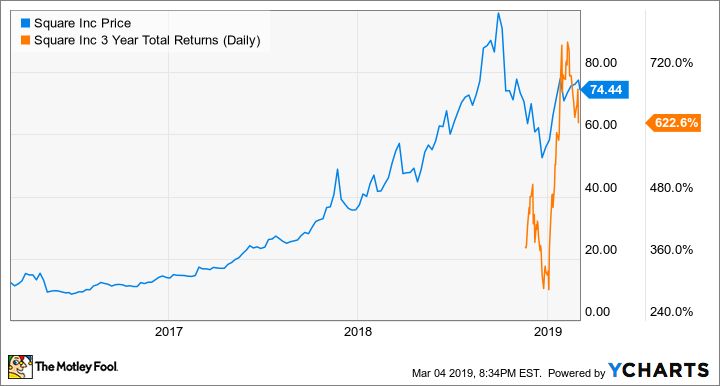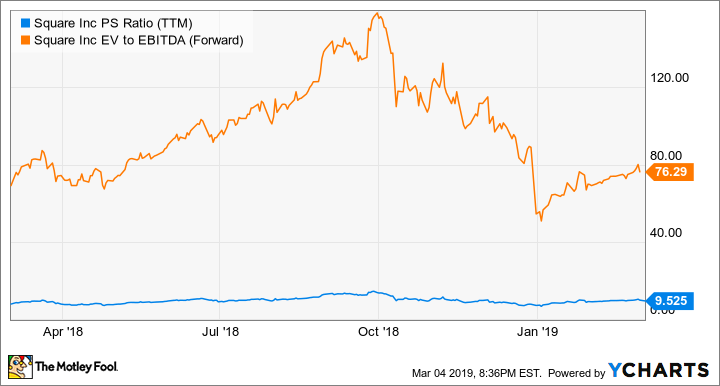Is Square a Sell?
If you've been a longtime investor in Square (NYSE: SQ), you're likely one happy camper. Over the past three years, Square's stock is up a ridiculous 622%.
Square has built out an impressive ecosystem around its original point-of-sale terminals, from small-business loans, to payroll software, and even a third-party food delivery platform, Caviar. In 2013, the company unveiled its peer-to-peer payments app, Square Cash, which doubled its user base in 2018 to over 15 million.
Nevertheless, it is always a good idea for investors to understand the bear argument for the stocks they own. On that note, BTIG analyst Mark Palmer is the most bearish Square analyst on Wall Street, with sell rating and $30 price target -- less than half of where the stock stands today.
Though over half of analysts still have a buy rating on Square, let's dig in to Palmer's take on the company.

Could Square's stock go down? Image source: Getty Images.
Undershooting profitability
Square did underwhelm investors in its recent earnings release. The company guided to revenue growth of roughly 41%, terrific for a normal business, but only in line with analyst estimates. However, Square's Q1 adjusted EBITDA guidance of $47 million-$51 million was well below consensus estimates of $70.3 million. For the full year, management guided to $405 million-$415 million in EBITDA, also below consensus estimates of $421 million.
While Square characterizes its rising costs as investments toward a large market opportunity, Palmer doubts that the company can achieve its impressive growth without heavier-than-expected spending.
Looming competition?
Some of that spending may be due to ward off Palmer's concerns about competition. Square's core payment processing segment is a desirable, high-margin business, which usually invites competitive threats.
In particular, Palmer worries about Fiserv's (NASDAQ: FISV) recent acquisition of First Data (NYSE: FDC). First Data makes the Clover point-of-sale system, a Square competitor. The combined companies say they intend to spend over $500 million over five years to "accelerate growth," which likely means putting serious weight behind Clover.
Larger customers are good...if they stay
Palmer's concerns about Clover stem from the fact that First Data tends to go after larger enterprises. While Square started as a small-business solution, it's made impressive headway with larger businesses over the years. In just two years, the proportion of businesses that process over $125,000 of gross payment volume (GPV) per year grew from 43% to 51% of Square's GPV. Businesses that process over $500,000 of GPV increased from 16% to 24%.
Palmer believes this presents concentration risk, especially if First Data makes headway with these large customers.
And credit risk, too
In addition to a higher reliance on large enterprises, Square has also grown its book of loans it makes through Square Capital. Last quarter, Square grew its loan book by 55%, higher than the company's total revenue increase of 51% and GPV growth of 28%.
Making more loans does benefit Square, as this increases customer retention for the company's terminals and services. But all loans carry risk.
Palmer doesn't necessarily think Square is making bad loans. However, he does argue that other lending institutions such as banks and loan-centric fintech companies trade at much lower valuations than Square, which currently trades at a price-to-sales ratio of 9.5 and a whopping 76.3 times next year's EBITDA.
SQ PS Ratio (TTM) data by YCharts.
Square counters the bears
In sum, Palmer is worried about looming competition, concentration risk, and credit risk. But on the conference call with analysts, CEO Jack Dorsey sought to tamp down these concerns. On competitive threats, he countered:
We did see a short-term kind of interest in what they're doing and maybe some customers switching over. But after months, we saw those same customers switch back. And the reason why is the quality of our software, the simplicity, the pairing with our hardware and the broader ecosystem. ... If we're just offering and we're just focused on providing payments in the Register, certainly there are so many other competitors out there. But when people come in for payments in the Register and then they use Payroll or their restaurant and they use Caviar or these are marketing and really getting offers from Square Capital, it's really hard to find that mix anywhere else, and that builds durability.
New CFO Amrita Ahuja also dismissed lending risks, saying Square is using the same strict loan underwriting criteria it always has. And on increased marketing spend, management said it's earning a full payback within three to four quarters, which is excellent.
Tread carefully with this great company
Management's explanations seem credible to me -- after all, they're the ones that built Square into the phenomenal success that it is. That being said, the stock is anything but cheap, so Square investors should definitely monitor the competition and credit risks cited by Palmer going forward.
More From The Motley Fool
Billy Duberstein has no position in any of the stocks mentioned. His clients may own shares of some of the companies mentoned. The Motley Fool owns shares of and recommends Square. The Motley Fool has a disclosure policy.

 Yahoo Finance
Yahoo Finance 

